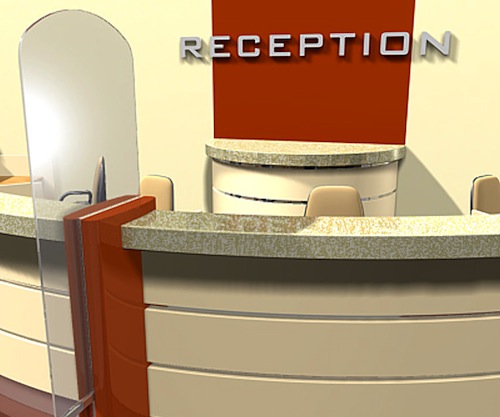
Hannah Gamble’s post about the Fence Family Brunch at this year’s AWP conference got me thinking about work. She and Fence Managing Editor Rob Arnold discussed their “worst jobs ever,” and I’m always intrigued to hear what creative people are willing to do to support themselves and their “habit.” These are questions I’m forever grappling with: what should I do for work? What can I do for work? And what will I do for work?
The “worst” job I had in semi-recent adulthood years was probably the best job ever for my writing: I was a bank receptionist in Madison, Wisconsin. Not a teller, mind you—they actually have to handle money and interact politely with customers all day long, or at least stand there, exposed, in the lobby. But I was a straight-up receptionist, though I “received” no one, not in person, anyway. My desk was on the second floor, situated in a protected nook, set off from the offices of the higher-ranking bank officials. I faced a window that looked out on Madison’s lovely capitol square—I could track the changing seasons from there. I did my work—filing, answering the phone, writing letters, creating binders for board meetings—and then I’d sit there and kind of space out and do my work, which at the time consisted of writing very short and spare poems, and maybe a book review here and there. I might get interrupted, but that was okay, too—I’d start a line or two, then a mortgage officer would lean on my desk to chat about the best way to skin a rabbit (this was Wisconsin, after all), and then when he left, his story might show up in the next lines, in some form or other.
The problem with this job can be summed up in these lines from C.D. Wright’s poem “Personals”: “I’m still trying to find a job / for which a simple machine isn’t suited.” I was over 30, over-educated, and soul-killingly bored on a daily basis. For a while I convinced myself that the job was fine because it fed my writing—but I didn’t stay convinced for long. I started teaching at the local community college in the evenings after work—my first college teaching gig—and I completely loved it. When I’d scraped together enough classes at various area schools, I quit my job at the bank, convinced I’d found the answer. (Ha!)
For the next few years, I worked my butt off. I drove from one school to the next, teaching four to five classes a semester. This must sound familiar to quite a few poets out there. I thrived on teaching, poured all my energy into it along with all my heart; the problem with this job was that I had nothing much left over for my work. I didn’t completely stop writing, but I wasn’t nearly as artistically driven or fulfilled as I’d been at the bank. But I didn’t really notice. I was too busy teaching.
Several years later now, my life has changed drastically. I’ve moved to New York, lost a full-time teaching job I dearly loved, had a son, and slowly added part-time teaching back into the mix, one class at a time. The beauty of this arrangement is that I’ve been able to be home with my son during these crucial early years, and I’ve returned to writing with a passion and dedication I haven’t felt since…high school, maybe? And I get to teach a little, too, which is immensely gratifying. The problem with this arrangement is: money. There’s never enough money. And now there are three of us.
Problem not solved.
Stay tuned for some other poets’ thoughts on the conundrum that is WORK.
Laura Sims is the author of three books of poems: My god is this a man (2014), Stranger (2009) and Practice...
Read Full Biography

